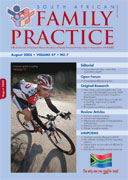Knowledge of, beliefs about and attitudes to disability: Implications for health professionals.
Abstract
Background: South Africa is a multicultural, multiracial and multilingual nation with many different values, traditions and cultural practices. Different belief systems may give rise to different attitudes and practices relating to disability, which may impact on rehabilitation. The purpose of this study was to investigate the knowledge, attitudes and beliefs relating to disability in three broad cultural groups in the Western Cape. Method: Sixty primary caregivers were interviewed by using a knowledge, attitude and belief (KAB) survey in a structured interview format. Probability and non-probability (systematic and purposive) sampling were used. The study used both quantitative and qualitative methods. Results: While caregivers from coloured and white communities generally had become acquainted with disability from an early age, caregivers in black communities often only learnt about disability following the birth of a disabled child. All caregivers had only a rather rudimentary knowledge of the causes of disability, but held positive attitudes towards people with disabilities and their integration into society. The qualitative data showed some differences in beliefs between the three groups in relation to the causes of disability and the need for rehabilitation. The data also revealed negative experiences across the groups in relation to education and the availability of transport, particularly amongst caregivers from black and coloured communities. Conclusions: Health professionals need to understand the culture, values, beliefs and expectations of their clients when providing rehabilitation services within a community-based model. There appears to be a need for improved disability awareness in schools and amongst transport service providers. (SA Fam Pract 2005;47(7): 40-44)
Published
2005-08-01
Section
Original Research
By submitting manuscripts to SAFP, authors of original articles are assigning copyright to the South African Academy of Family Physicians. Copyright of review articles are assigned to the Publisher, Medpharm Publications (Pty) Ltd, unless otherwise specified. Authors may use their own work after publication without written permission, provided they acknowledge the original source. Individuals and academic institutions may freely copy and distribute articles published in SAFP for educational and research purposes without obtaining permission.

